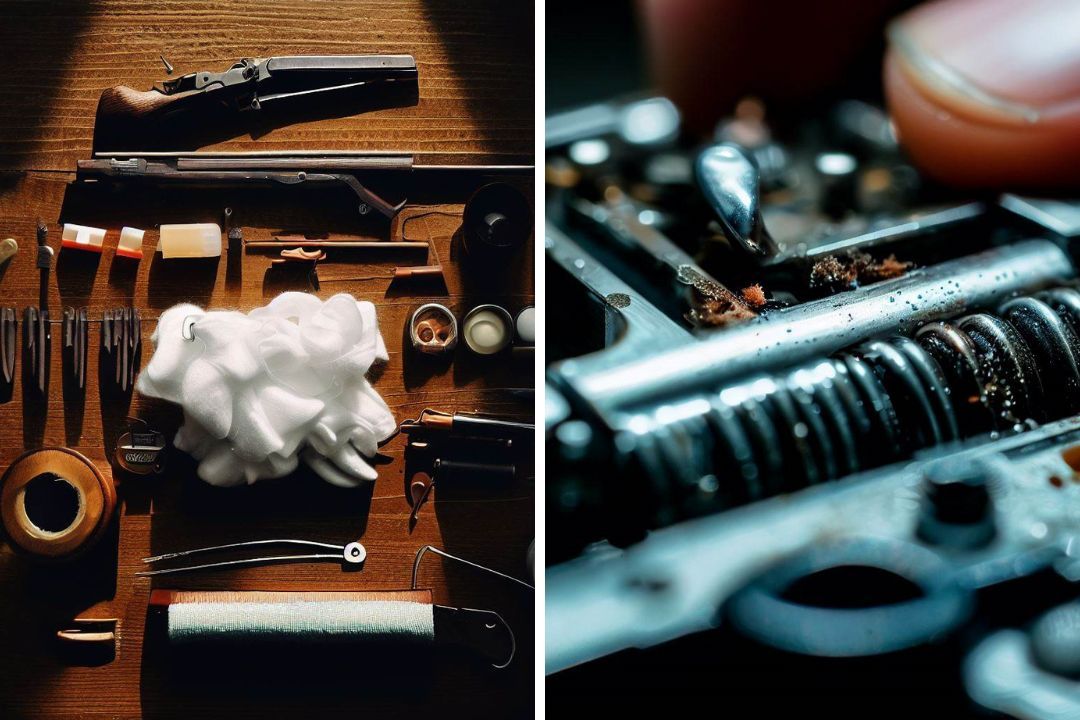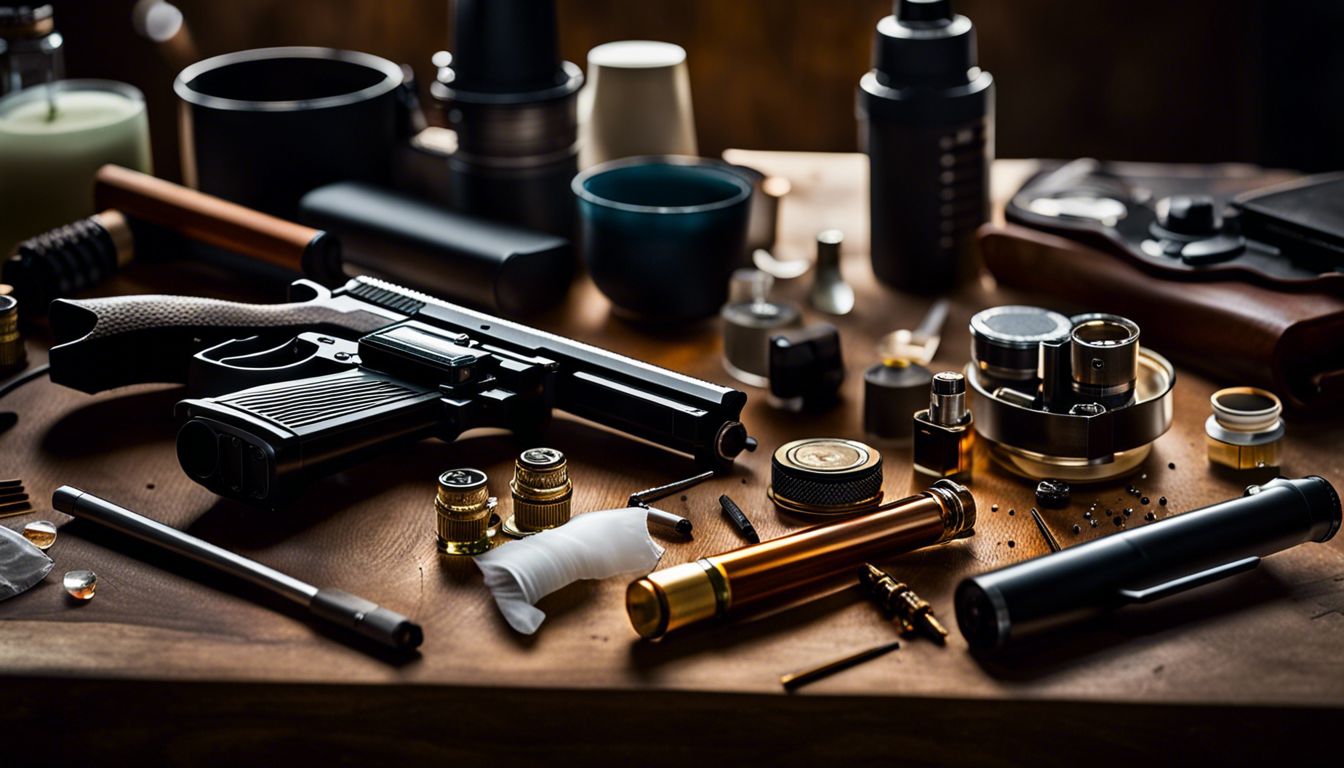Gun Cleaning Hacks: Know How to Clean a Gun Without a Cleaning Kit
Don't have a gun cleaning kit? No problem! Check out these DIY methods using common household items to keep your firearm in top shape. Clean your gun like a pro with everyday materials and say goodbye to expensive kits!
If you've ever found yourself in need of cleaning your gun without a proper cleaning kit, you're not alone.
In fact, many everyday household items can effectively clean a firearm without the need for specialized tools.
This article will guide you through a simple step-by-step process on how to achieve this using readily available materials in your home.
Stay with us to discover these unexpected yet effective methods for gun-cleaning. Learn how to clean your gun without a cleaning kit using common household items.
Key Takeaways
- Disassemble the gun properly to access all parts that need cleaning.
- Gather household items such as cotton swabs, patches, bore solvent, lubricating oil, and a clean rag for effective cleaning.
- Create a homemade gun-cleaning solvent using vinegar or alcohol diluted with water.
- Follow step-by-step instructions for thorough cleaning and lubrication of all metal parts.
- Take necessary precautions to ensure safety when cleaning a gun without a kit.
- Understand the importance of regular gun maintenance in maintaining the longevity, functionality, safety, and reliability of your firearm.
How to Clean a Gun Without a Cleaning Kit
To clean a gun without a cleaning kit, start by disassembling the gun and gather household items such as a clean rag, oil, paper towels, or soft cotton cloth, and a cutting tool like scissors or a knife.
Disassemble the gun
Begin the process of cleaning your gun by disassembling it. This is an essential step as it allows you to reach all the parts that need cleaning.
- Ensure the gun is not loaded.
- Remove the magazine or empty the cylinder.
- Depress the takedown lever, slide stop, or button to break down the firearm.
- Take out the bolt or slide from the frame.
- If necessary, remove further components like the barrel, guide rod, and spring for a thorough cleaning.
Gather required household items
To clean a gun without a cleaning kit, you will need the following household items:
- Cotton swabs: These are useful for reaching tight spots and removing dirt or debris.
- Patches: Used to apply cleaning solvent and remove carbon buildup.
- Bore solvent: Essential for breaking down fouling and residue in the barrel.
- Lubricating oil: Keeps all moving parts properly lubricated for smooth operation.
- Clean rag: Used for wiping down surfaces and removing excess oil.
- Paper towel: Can be used in place of a clean rag if necessary.
- Soft cotton cloth or microfiber cloth: Ideal for polishing and removing fingerprints or smudges.
- Cutter, knife, or scissors: These tools can be used to cut patches or cloth into the desired size.
- Ramrod (long and plain): Helps push patches through the bore when cleaning.
Prepare gun cleaning solvent
To prepare a gun cleaning solvent without a cleaning kit, you can make use of household items such as vinegar or alcohol.
Vinegar works well as a natural solvent to break down residue and carbon buildup on the gun, while alcohol can help dissolve grease and oil. Dilute either substance with water in a spray bottle or container, creating an effective cleaning solution for your firearm.
Remember to mix the solution in proper proportions based on your specific needs before proceeding with the gun cleaning process.
Step-by-step gun cleaning process
To clean a gun without a cleaning kit, follow these step-by-step instructions:
- Disassemble the gun: Start by disassembling the gun according to the manufacturer's instructions. This will allow you to access all the necessary parts for cleaning.
- Gather required household items: Collect basic household items as mentioned above. It is also a good idea to keep a multitool handy.
- Prepare gun-cleaning solvent: Create your own gun-cleaning solvent by mixing equal parts of vinegar and water. This homemade solution is effective in removing stubborn dirt and grime.
- Wipe off old oil, carbon, and foreign materials: Use a clean rag or paper towel to wipe off any old oil, carbon buildup, and other foreign materials from the bolt and other metal surfaces of the gun. Be thorough in this step to ensure proper cleaning.
- Apply bore solvent to clean the barrel: Dampen a cotton patch or swab with the bore solvent and run it through the barrel several times. This will help break down any residue or fouling inside the barrel.
- Scrub metal parts with solvent-soaked cloth: Dip a cloth into the bore solvent mixture and scrub all metal parts of the gun thoroughly. Pay close attention to areas with heavy carbon buildup or dirt.
- Use cotton swabs for hard-to-reach areas: Use cotton swabs soaked in bore solvent to clean hard-to-reach places such as crevices, corners, and small openings on the gun.
- Dry and lubricate moving parts: Once all metal parts are cleaned, use a dry cloth or paper towel to remove any excess moisture. Then apply lubricating oil to all moving parts of the gun to ensure smooth operation.
- Reassemble the gun: Put all cleaned components back together according to the manufacturer's instructions.
- Perform a functional check: Before storing the gun, ensure that all parts are properly reassembled and perform a functional check to verify that the gun is working correctly.

Precautions for cleaning a gun without a kit
To ensure a safe and effective gun cleaning process without a kit, it is important to take certain precautions.
- Always make sure the gun is unloaded before beginning the cleaning process.
- Be cautious when using household items as substitutes for professional tools, as they may not provide the same level of precision or effectiveness.
- Avoid using abrasive materials that may scratch or damage the gun's surfaces.
- Thoroughly read and understand the manufacturer's instructions for cleaning the specific type of firearm you have.
Make sure to follow this basic safety in order to avoid any potential mistakes or mishaps during the cleaning process.
Final tips and recommendations
To ensure a thorough and effective gun cleaning without a kit, here are some final tips and recommendations.
Firstly, always remember to properly disassemble the gun and clean each individual part separately. This will allow for more detailed cleaning of hard-to-reach areas.
Secondly, Make sure to use the appropriate tools for cutting or trimming patches and other materials to fit specific areas of the gun. This will help in achieving a more precise cleaning process.
Additionally, when applying lubricating oil, use it sparingly and focus on key moving parts such as the slide or bolt assembly.

The Importance of Gun Cleaning
Gun cleaning is crucial for maintaining the longevity, functionality, safety, and reliability of your firearm.
Longevity of the gun
Properly cleaning a gun without a cleaning kit is crucial for maintaining the longevity of the firearm. Over time, dirt, residue, and debris can accumulate in the barrel and other parts of the gun, leading to decreased performance and potential malfunctions.
Regular cleaning of your firearm helps prevent rusting and wear on critical components, ensuring that your gun will function reliably for years to come.
By following proper cleaning techniques, you can extend the lifespan of your firearm without relying on a specialized cleaning kit.
Understanding gun functionality
To properly clean a gun, it's essential to understand its functionality. This includes knowing how the different parts work together and what their purposes are. For example, understanding the bolt and barrel helps in identifying areas where carbon buildup may occur and need cleaning.
By having a basic understanding of the various mechanisms within your firearm, you can effectively clean each component without missing any critical areas. Taking the time to familiarize yourself with your gun's functionality ensures a thorough and efficient cleaning process that contributes to its longevity and reliable performance over time.
Safety and reliability
Ensuring the safety and reliability of a gun is paramount, regardless of whether you have a cleaning kit or not. Regularly cleaning your firearm helps remove any dirt, debris, or residue that can affect its performance.
A clean gun reduces the risk of malfunctions or misfires, ensuring that it functions smoothly when you need it most. Additionally, regular maintenance also allows you to inspect your gun for any potential issues or wear and tear that may require professional attention.
By taking the time to clean your gun properly, you are investing in its longevity and ensuring that it remains a reliable tool for self-defense or recreational use.
Cost savings
Cleaning a gun without a cleaning kit can save you money in the long run. Instead of investing in expensive cleaning kits, you can use common household items to effectively clean your firearm.
By using items like cotton swabs, cleaning patches, bore solvents, and lubricating oil, you can ensure that your gun is properly maintained without breaking the bank. Regularly cleaning your gun without a kit not only saves you money on specialized tools but also helps prevent costly repairs or replacements due to neglect or malfunction.
Troubleshooting Tips for Cleaning Guns without a Kit
- If you don't have gun cleaning solvent, you can use a mixture of vinegar and water as an alternative. Mix equal parts vinegar and water in a bowl or spray bottle.
- If you encounter stubborn carbon buildup, use a toothbrush or cotton swabs dipped in the vinegar solution to scrub away the residue.
- If you don't have a ramrod or cleaning rod, you can use a long, plain object like a dowel or wooden stick to push patches through the barrel.
- If you don't have any lubricating oil, you can use vegetable oil or even motor oil as a temporary solution. Just be sure to wipe off any excess oil after applying it to prevent it from attracting dirt and debris.
- If you're having trouble removing small screws or bolts, and don't have a multi-tool, try using pliers or adjustable wrenches to provide extra leverage. Be careful not to damage the gun's finish while doing so.
Remember that these troubleshooting tips are meant for temporary solutions and should not replace regular gun cleaning with proper tools and kits.
Household Cleaning Substances to Avoid
Some of the most common household cleaning substances that should be avoided when cleaning firearms include:
- Abrasive cleaners: These cleaners can scratch the finish of your gun and damage the delicate mechanisms.
- Ammonia-based cleaners: These cleaners can react with the metal in your gun and cause corrosion.
- Bleach: Bleach can damage the finish of your gun and also cause corrosion.
- Citrus-based cleaners: These cleaners can leave a residue that can attract moisture and lead to rust.
- Degreasers: These cleaners can strip away the protective oil from your gun and leave it exposed to rust and corrosion.
- Hydrogen peroxide: Using hydrogen peroxide alone can damage the finish of your gun and also cause corrosion. However, mixing with equal amount of vinegar yields an efficient cleaning solution.
- WD-40: WD-40 is a good lubricant, but it is not a good cleaner. It can leave a residue that can attract moisture and lead to rust.
Benefits of Using Household Items for Gun Cleaning
Using household items for gun cleaning offers several benefits.
Firstly, it is convenient and cost-effective. Instead of purchasing a specialized cleaning kit, you can utilize common household items such as cotton swabs, patches, and a clean rag.
This saves you money and ensures that you have readily available supplies for regular gun maintenance.
Secondly, using household items allows for improvisation and resourcefulness. While professional gun cleaning kits may offer specific tools and solvents, everyday objects like scissors or a knife can be used to cut patches or remove excess oil from the gun parts.
Lastly, utilizing household items encourages self-sufficiency and independence in maintaining your firearms. By learning how to effectively clean guns without specialized tools or kits, you become more knowledgeable about your firearm's mechanisms and ensure its longevity through regular maintenance.
Overall, using household items for gun cleaning not only helps save money but also promotes resourcefulness and self-reliance in properly caring for your firearms.
Drawbacks of Using Household Items for Gun Cleaning
While using household items for gun cleaning has some advantages, there are also some drawbacks that should be considered.
- Can damage the delicate mechanisms and finishes of your gun. Certain household items such as steel wool, stiff brushes, and abrasive materials can damage your gun's finish or delicate parts if used incorrectly.
- May not be effective in removing all dirt and debris, leading to potential malfunctions. Household items might not be as effective in removing stubborn dirt or residue as specialized cleaning kits, leading to potential malfunctions down the line.
- Can leave behind lint, fibers, and residues, which can damage the gun's internal mechanisms. The use of household items such as cotton swabs and cleaning rags can leave behind small bits of lint, fibers, or residues that can interfere with the gun's performance over time.
- May not be sturdy enough to reach certain parts of the gun, leaving them incomplete. Without specialized cleaning tools, it may be difficult to reach certain parts of the gun that require proper cleaning. This can leave them incomplete, leading to potential malfunctions over time.
Therefore, while using everyday objects for gun cleaning has its benefits, it is important to use caution and care when doing so in order to ensure the safety and reliability of your firearm.
Always remember to read and understand the instructions of any cleaning kit or solvent you are using, as well as familiarize yourself with your gun's components before attempting any DIY maintenance. Additionally, it is important to seek professional advice from certified gunsmiths if needed for more complicated repairs or maintenance.
FAQs
1. Can I clean a gun without a cleaning kit?
Yes, you can clean a gun without a cleaning kit by using common household items such as cotton swabs, toothbrushes, and cleaning solvents. However, it is important to use caution and care when doing so, as some everyday objects may not be strong or effective enough to properly remove dirt and debris.
2. What are some alternative cleaning solutions I can use?
In the absence of a gun cleaning kit, most common household alternatives you can use to clean your firearms include:
- White vinegar and hydrogen peroxide: Mix equal parts of white vinegar and hydrogen peroxide to create a cleaning solution.
- Basic household items: Use cotton swabs, patches, bore solvent, lubricating oil, and a cleaning rod.
- Nail polish remover: Use a small amount of nail polish remover on a patch to clean the bore
- Murphy Oil Soap: Use a small amount of Murphy Oil Soap on a patch to clean the bore.
- WDC (water-displacing compound) or a similar product can also be used when cleaning a gun without a cleaning kit.
3. How do I disassemble my gun for cleaning without a kit?
To disassemble your gun for cleaning without a kit, refer to the manufacturer's instructions or find online resources specific to your firearm model. It is important to follow proper safety precautions and ensure that the firearm is unloaded before beginning the disassembly process.
4. Are there any additional tools I might need when cleaning a gun without a kit?
In addition to basic household items like cotton swabs and toothbrushes, it may be helpful to have lint-free cloths or patches for wiping down surfaces, lubricating oil for metal parts, and brushes with appropriate bristle stiffness for different areas of the firearm (e.g., brass brush for barrels).
However, if you are planning to restore an old gun, it is best to get a universal cleaning kit and more importantly a ultrasonic firearm cleaner.
5. Do I need professional help for more complicated repairs?
It is always a good idea to seek professional advice from certified gunsmiths if you are doing any complicated repairs or maintenance. This ensures that your firearm is properly maintained and repaired without causing further damage.
Conclusion
In conclusion, cleaning a gun without a cleaning kit is possible with basic household items and some improvisation.
While it may not be as convenient as using a specialized kit, it can still effectively remove debris and maintain the functionality of your firearm.
Remember to take necessary precautions and prioritize safety throughout the cleaning process. By following these steps, you can keep your gun in top condition without the need for professional tools or kits.
After all your efforts to maintain your firearm with household items, you might want to explore more effective and efficient methods. Check out our articles on professional gun cleaning supplies.
These tools can simplify the cleaning process and ensure a deeper clean. Don't hesitate to invest in your firearm's longevity and performance! Explore the essential gun cleaning supplies now.


